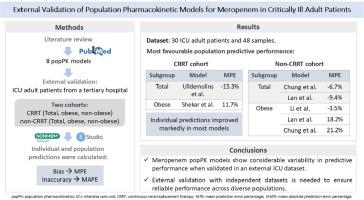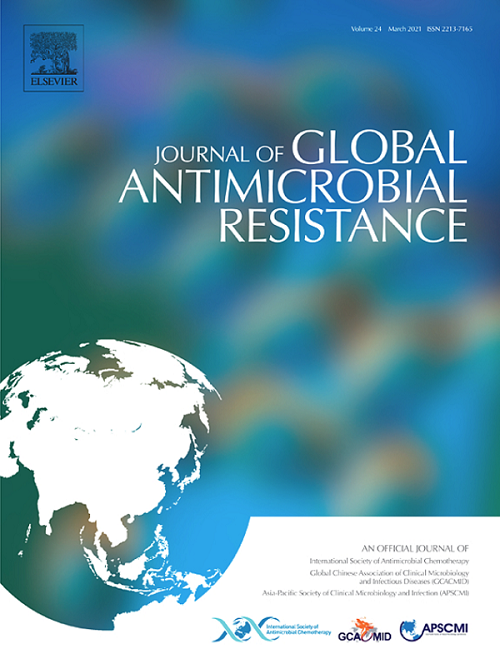危重成人患者美罗培南群体药代动力学模型的外部验证。
IF 3.2
3区 医学
Q2 INFECTIOUS DISEASES
引用次数: 0
摘要
背景:虽然已经开发了几种美罗培南群体药代动力学(popPK)模型,但很少进行外部验证,这是确认其在现实环境中的稳健性和适用性的关键一步。目的:本研究旨在对已发表的美罗培南popPK模型进行外部评估,以评估其预测性能,并确定其在重症监护病房(ICU)环境中实施模型知情精确给药策略的适用性。方法:外部验证数据集包括回顾性收集的某三级大学附属医院的数据。从文献中选择8个已发表的popPK模型,计算偏倚和不准确性。在两个亚群中评估预测性能:CRRT和非CRRT患者,并根据BMI进一步分层。结果:使用独立数据集(30例ICU患者和48例样本)对8种popPK模型进行了评估。ulldemoins等人的模型在整个CRRT队列中显示出最低的人群水平预测偏差。在整体非crrt队列中,Chung等人和Lan等人的模型显示出出色的群体和个体预测性能。在肥胖亚群中,Shekar等人的模型在CRRT队列中显示出最低的偏倚和不准确性,而Li等人、Lan等人和Chung等人的模型在非CRRT队列中表现最好。结论:已发表的美罗培南popPK模型在ICU患者的外部数据集中验证时,其预测性能表现出相当大的可变性,未能推广到更广泛的患者群体。这些发现强调了使用独立数据集进行外部验证的必要性,以确保在不同人群中具有可靠的性能。本文章由计算机程序翻译,如有差异,请以英文原文为准。

External validation of population pharmacokinetic models for meropenem in critically ill adult patients
Background
While several meropenem population pharmacokinetic (popPK) models have been developed, few have undergone external validation, a crucial step to confirm their robustness and applicability in real-world settings.
Objective
This study aimed to conduct an external evaluation of published meropenem popPK models to assess their predictive performance and determine their suitability for implementing Model-Informed Precision Dosing strategies in the intensive care unit (ICU) setting.
Methods
The external validation dataset consisted of data retrospectively collected from a tertiary university hospital. Eight published popPK models were selected from the literature and bias and inaccuracy were calculated. Predictive performance was assessed in two subpopulations: continuous renal replacement therapy (CRRT) and non-CRRT patients, with further stratification by body mass index.
Results
Eight popPK models were evaluated with an independent dataset of 30 ICU patients and 48 samples. The Ulldemolins et al. model exhibited the lowest bias for population-level predictions in the overall CRRT cohort. In the overall non-CRRT cohort, the models by Chung et al. and Lan et al. demonstrated excellent population and individual prediction performance. Within the obese subpopulation, the Shekar et al. model showed the lowest bias and inaccuracy in the CRRT cohort, while the models by Li et al., Lan et al., and Chung et al. performed best in the non-CRRT cohort.
Conclusions
Published meropenem popPK models exhibit considerable variability in predictive performance when validated in an external dataset of ICU patients failing to generalize across broader patient populations. These findings underscore the need for external validation with independent datasets to ensure reliable performance across diverse populations.
求助全文
通过发布文献求助,成功后即可免费获取论文全文。
去求助
来源期刊

Journal of global antimicrobial resistance
INFECTIOUS DISEASES-PHARMACOLOGY & PHARMACY
CiteScore
8.70
自引率
2.20%
发文量
285
审稿时长
34 weeks
期刊介绍:
The Journal of Global Antimicrobial Resistance (JGAR) is a quarterly online journal run by an international Editorial Board that focuses on the global spread of antibiotic-resistant microbes.
JGAR is a dedicated journal for all professionals working in research, health care, the environment and animal infection control, aiming to track the resistance threat worldwide and provides a single voice devoted to antimicrobial resistance (AMR).
Featuring peer-reviewed and up to date research articles, reviews, short notes and hot topics JGAR covers the key topics related to antibacterial, antiviral, antifungal and antiparasitic resistance.
 求助内容:
求助内容: 应助结果提醒方式:
应助结果提醒方式:


